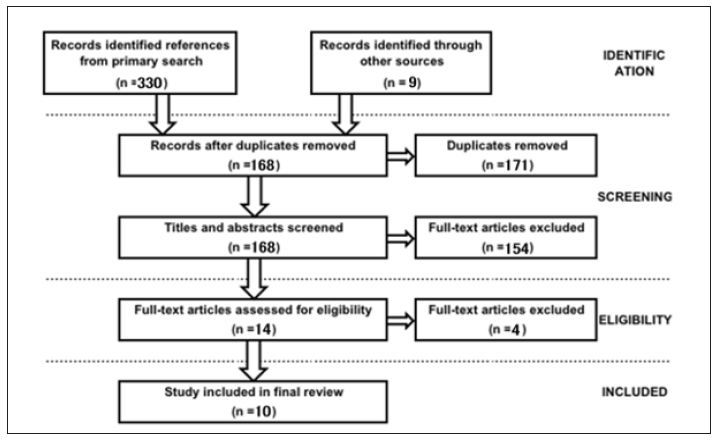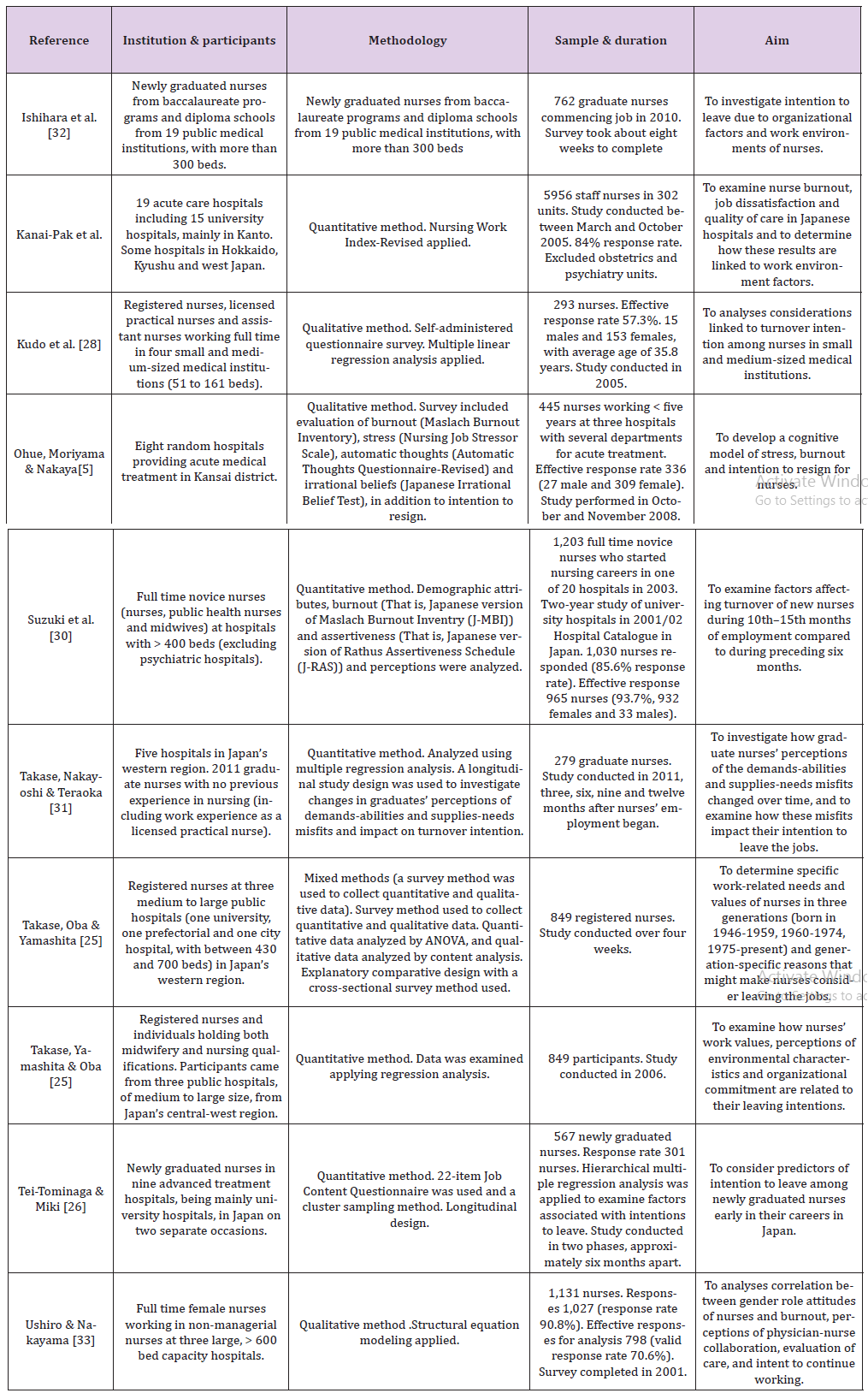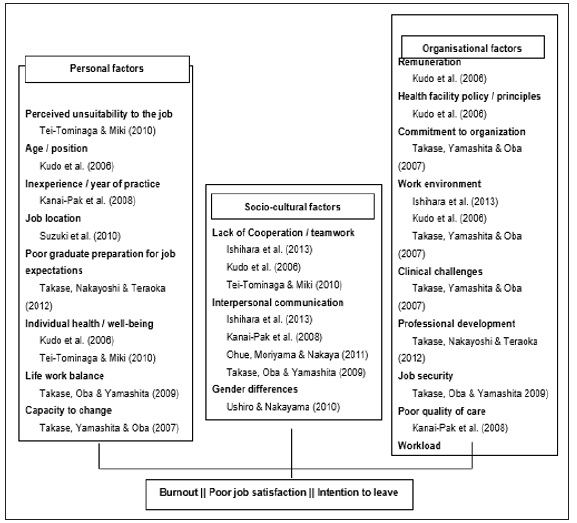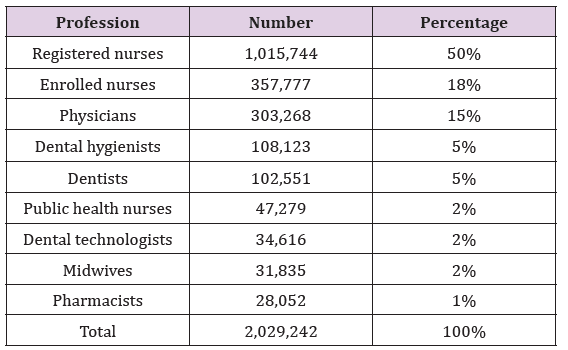A Review of Factors Affecting Nursing Turnover in Japan
Introduction
At present, the Japanese health system, like most countries, significantly depends on nurses delivering quality care to individuals, families, and communities. Nurses comprise the majority of health professionals in Japan; Table 1 shows that out of 2,029,242 health professionals, almost 70% are nurses (including both registered and enrolled nurses). Thus, nursing shortages can prove costly and detrimental to a nation’s health system [1]. Closely related to nursing shortages is nursing turnover, which can negatively impact the health sector’s capacity to satisfy patient needs and provide quality care [2]. A high turnover rate can affect nurses’ wellbeing and productivity [3]. Hence, for these reasons, a continuous supply of nurses is imperative to the wellbeing and progress of Japanese society. A better understanding regarding nursing turnover is necessary to adequate address this growing problem. Thus, the present paper includes a systematic review of nursing turnover in Japan.
Turnover refers to the movement of individuals within an organization, profession, or industry. In general, turnover is understood as the rate at which employees leave a company or organization and are replaced by new people [4]. A high nurse turnover rate has been associated with dissatisfaction [5]. Job satisfaction refers to how a person feels about various aspects of his or her employment [6] and has been identified as a factor contributing to an employee’s intent to leave and job turnover [7]. “Intent to leave” refers to an employee’s plan to quit his or her existing job and/or find another job, whether in the same or different profession [4]. The intent to leave is a critical factor in predicting nursing turnover [8]. Turnover is highly related to burnout, which is linked to job dissatisfaction. Burnout is the severe physical, emotional, and mental fatigue experienced by individuals on the job. Nurses, for example, are at high risk for burnout due to the intense nature of providing multi-pronged medical care [9].
The number of nurses has increased in Japan. Between 2002 and 2014, nurse employment rose by 30%, from 1,163,393 to 1,506,380; however, this was not sufficient to meet the nursing demand of 1,623,800 in 2014 [10-12]. By 2025, it is estimated that nursing demand will rise to 1,844,000. However, the nurse supply is expected to remain short of this demand [13], especially within small and medium-sized hospitals. Competition for nurses tends to result in larger hospitals paying higher salaries and attracting a greater number of nurses than smaller ones [14]. Due to the discrepancy between nursing supply and demand, concerns over shortages have risen. According to statistics from 2012, roughly 191,000 registered nurses joined the profession, which includes around 47,000 newly qualified nurses (and around 144,000 with prior experience rejoining the workforce or transferring). However, roughly 161,000 left the profession, with turnover being higher in large cities [15]. Throughout Japan, this nursing shortfall creates several healthcare delivery challenges. This is even more problematic as the gap between supply and demand is not estimated to decrease any time soon [15].
CINAHL, MEDLINE, ProQuest Health & Medical Collection, PubMed and Google Scholar were used to conduct a regimented literature review. Papers published between 2006 and 2016 were analyzed to determine relevancy. Papers were chosen from this time period since work environments dramatically change each year, and new technology continues to be introduced. Therefore, it seemed appropriate to review papers published in the last ten years in order to have an overview of changing contexts, as well as current factors, affecting nursing turnover in Japan. The following search terms were used: ‘intent to leave’, ‘turnover’, ‘burnout’, ‘job dissatisfaction’, ‘nurse’ and ‘Japan’. The last date of access for all databases was 1-6-2017. In the case of Google Scholar, the number of hits was inordinately high; therefore, another search was conducted combining the keywords, which yielded 204 papers for possible inclusion (Table 2). To assure review quality, PRISMA guidelines [21] were employed. During identification, 500 papers were initially deemed relevant, including nine additional papers culled from the reference lists of retrieved papers. During the screening process, duplicate and irrelevant papers (determined by assessing titles and abstracts) were excluded.
 During the eligibility process, full-text articles were assessed. Consequently, 10 studies were included in this review. Table 2 details the number of papers initially retrieved through database searches, while (Figure 1) highlights the screening process, with a detailed number of references based on PRISMA guidelines. A metaanalysis was initially considered for the present review; however, as the included studies were highly heterogeneous, an adequate metaanalysis could not be pursued. Consequently, a narrative synthesis methodology [22] was applied. Therefore, the results section of each paper was considered thematically, and common themes were determined. Furthermore, to assure review quality and to avoid bias, qualitative studies were assessed applying the Critical Appraisal Skills Programmed method [23], and non-experimental studies were assessed using Law’s Critical Review Form [24].
During the eligibility process, full-text articles were assessed. Consequently, 10 studies were included in this review. Table 2 details the number of papers initially retrieved through database searches, while (Figure 1) highlights the screening process, with a detailed number of references based on PRISMA guidelines. A metaanalysis was initially considered for the present review; however, as the included studies were highly heterogeneous, an adequate metaanalysis could not be pursued. Consequently, a narrative synthesis methodology [22] was applied. Therefore, the results section of each paper was considered thematically, and common themes were determined. Furthermore, to assure review quality and to avoid bias, qualitative studies were assessed applying the Critical Appraisal Skills Programmed method [23], and non-experimental studies were assessed using Law’s Critical Review Form [24]. Results
ResultsA summary of the reviewed studies is shown in Table 3. Five of the 10 papers were quantitative, four were qualitative, and one paper employed mixed methods. The papers covered a range of settings, including urban and rural hospitals with different bed capacities (ranging from 50 to 700 beds). The present results are described according to key variables of interest, including intent to leave, turnover, burnout, and job dissatisfaction. Across all papers, factors contributing to nurses quitting their job and/or their profession are discussed. Each paper addresses factors leading to a job/career exit and the main factors impacting the exit. A thematic analysis was identified as contributing to nurses’ decision to leave either their job or, more significantly, the profession. These factors are outlined in Figure 2.
 Figure 2: Factors associated with burnout, poor job satisfaction or intention to leave.
Figure 2: Factors associated with burnout, poor job satisfaction or intention to leave. Personal Factors
Personal FactorsPerceived unsuitability to the job: When a nurse believes he or she is unsuitable to his or her profession, he or she is likely to leave not only the job but also the profession [25]. While many individuals pursue nursing during their university studies, realities of the job or profession can lead to reservations regarding this chosen career path. Unsuitability to the job or profession has been identified as leading to nurse turnover, especially among newly graduated nurses [26-30]. A lack of understanding regarding the role of a nurse also appears to contribute to one’s intent to leave [31].
Lack of Co-Operation and Teamwork: A lack of co-operation and/or teamwork has been highlighted in several studies as impacting nurses’ intent to leave and turnover. Newly graduated nurses, for instance, highly value the level of support they receive from colleagues and supervisors. Nearly 10% of newly graduated nurses indicate a desire to leave nursing. Critical to this decision is whether nurses receive adequate social support from colleagues and supervisors. Organisational support can reduce burnout and contribute to job satisfaction, thus increasing commitment to the job and profession as a whole. Similarly, colleagues and supervisors play a critical role in nurse turnover. For instance, one study found that among hospitals with fewer than 500 beds, managerial and co-worker support significantly determined nurses’ intent to leave. Those nurses also stated that management styles and attitudes contributed to their intent to leave. Social support from peers, through a strong and interpersonal work ethic, was also highlighted as reducing the intent to leave.
Remuneration: Actual remuneration, and a lack of transparency regarding remuneration reviews, may also be impacting turnover among nurses. In one study, nurses reported being dissatisfied with their salary and poor implementation of policies necessary to facilitate fair salary increases. Remuneration appears to be important based on historical factors. For instance, among individuals born after 1960, remuneration was more important relative to those born between 1946 and 1959. This could result from a lack of recognition or autonomy often perceived among nurses born between 1960 and 1974, which could perhaps be alleviated through fair salary compensation.
Burnout and job dissatisfaction are related; together, they influence nurses’ intentions to leave the profession. Psychological distress and cumulative fatigue impact nurses’ intent to leave. Burnout can also influence several factors related to turnover, including interpersonal conflicts, skill mismatches and excessive workload. Likewise, a lack of cooperation among nurses and other health professionals within hospital environments leads to burnout and job dissatisfaction, which can significantly impact turnover.
Interactions between Contributing Factors
No single factor, on its own, fully explains the shortage of nurses in Japan. Nurses quit their job and/or leave the profession for various reasons. Obtaining a comprehensive understanding of the motives for nurses leaving their jobs is inevitably complex. The context and circumstances surrounding each individual nurse will impact his or her decision to stay in a job and/or overall profession. The present analysis observed that intentions to leave and turnover are inextricably linked to various factors, which all contribute to the nursing shortage in Japan. For instance, inexperience, burnout, and job dissatisfaction are all linked to the delivery of poor healthcare. Specifically, burnout and work engagement are strongly related to both job and career satisfaction, as well as intentions to leave. Moreover, it appears that nurses who work in inadequately staffed units often express job dissatisfaction, stress, and burnout, which prompt them to seek new employment. Thus, future studies should be carried out to explore the significance of these factors in relation to nursing turnover in Japan.
Considering that so many different factors contribute to intent to leave and turnover among nurses, it is inevitable that various strategies will need to be implemented to address nurse shortages resulting from high turnover. The study suggests that health and well-being courses designed to improve positive thinking for nurses may contribute to reducing their work-related stress and burnout. Acknowledging the efforts and contributions of nurses to the profession, career development and collegial approaches to management are also likely to have a significant positive influence on the intention to leave, and reduce turnover. Morale among nurses may be promoted by improving the relations between nurses and physicians. Physicians could be trained in acknowledging the efforts and contributions of nurses to the health profession. All participants in the delivery of quality health care need to be recognized by the system, to make it work more effectively. Managerial development too may lower turnover among nurses, particularly new graduates and less experienced nurses. Sound relations between nurses and their peers can also effectively reduce negative influences on nurse turnover.
A number of studies have been undertaken which show that the factors affecting nursing turnover in Japan encompass personal, socio-cultural and organizational elements. Therefore, longitudinal studies are needed which explore more deeply and monitor these factors that are not static but changing over time. Furthermore, it would be helpful to carry out qualitative inquires examining the impact of nursing turnover on the well-being and productivity of those that remain in the workforce. In order to better understand how changing societal and work conditions over time lead nurses to leave a post or the profession, researchers might employ narrative methods to collect and analyses their stories. In general, more research is warranted in order to better understand turnover behavior and how turnover within the skilled nursing workforce impacts the capacity of the health sector to respond to the increasing demands for health care.
Generalizations about each particular nurse’s decision to leave their job or the profession are difficult to make. The interplay between various subjective and objective factors lead each particular nurse to decide to leave their job or the profession. The manner in which a nurse describes their decision to leave too may have a bearing on the analysis. All this makes it difficult to assess each separate factor contributing towards nurses’ intent to leave. However, certain common threads have been identified in the literature both in Japan and more generally internationally. These include interpersonal relations, skills mismatch and poor quality of care to name a few. Other factors, however, also contribute. Ultimately, each factor may have a varying degree of influence to each individual’s decision to resign. When many individuals decide to leave a profession though, an analysis of the factors determining the decision need to be considered - particularly when the profession is significant to society and the health and well-being of its members. Delivery of quality health care becomes critical as it becomes more difficult to attract and retain nurses. High nurse turnover can be costly and detrimental to society, imposing a heavy burden on the delivery of health care. Attempting to find a solution to the supply factors contributing to nurses leaving the profession is not only a worthwhile pursuit for the profession, but more critically for society generally. Nurses must feel valued in their job and must feel like they are contributing. Only then will the quality of health care in society improve and Japan’s and other nations’ welfare progress and advance.
More BJSTR Articles : https://biomedres01.blogspot.com




No comments:
Post a Comment
Note: Only a member of this blog may post a comment.